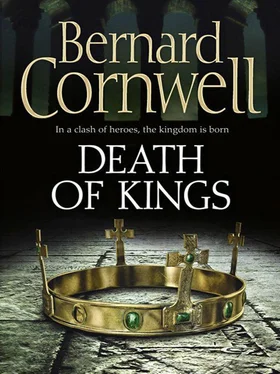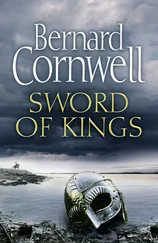And my angels were a lure to persuade them that there was reputation to be made in war. ‘Have any Danes visited the tomb?’ I asked Ludda.
‘Two, lord,’ he said, ‘both merchants.’
‘And you told them?’
Ludda hesitated, glanced at Æthelflaed, then back to me. ‘I told them what you ordered me to tell them, lord.’
‘You did?’
He nodded, then made the sign of the cross. ‘I told them you would die, lord, and that a Dane would earn great renown by slaying Uhtred of Bebbanburg.’ Æthelflaed drew in a sharp breath and then, like Ludda, made the sign of the cross. ‘You told them what?’ she asked.
‘What Lord Uhtred told me to tell them, lady,’ Ludda said nervously.
‘You’re risking fate,’ Æthelflaed told me.
‘I want the Danes to come,’ I said, ‘and I need to offer them a bait.’
Because Plegmund was wrong, and Æthelhelm was wrong, and Edward was wrong. Peace is a fine thing, but we only have peace when our enemies are too scared to make war. The Danes were not quiet because the Christian god had silenced them, but because they were distracted by other things. Edward wanted to believe they had abandoned their dreams of conquering Wessex, yet I knew they would come. Æthelwold had not abandoned his dream either. He would come, and with him would come a savage horde of sword-Danes and spear-Danes, and I wanted them to come. I wanted to get it over. I wanted to be the sword of the Saxons.
And still they did not come.
I never did understand why it took the Danes so long to take advantage of Alfred’s death. I suppose if Æthelwold had been a more inspirational leader instead of being a weak man then they might have come sooner, but they waited so long that all Wessex was convinced that their god had answered their prayers and made the Danes peaceable. And all the while my angels sang their two songs, one to the Saxons and one to the Danes, and perhaps they made a difference. There were plenty of Danes who wanted to nail my skull to their gable, and the song of the tomb was an invitation.
Yet they hesitated.
Archbishop Plegmund was triumphant. Two years after Edward’s coronation I was summoned to Wintanceaster and had to endure a sermon in the new great church. Plegmund, stern and fierce, claimed that God had conquered when all the swords of man had failed. ‘We are in the last days,’ he said, ‘and we see the dawning of Christ’s kingdom.’
I remember that visit because it was the last time I saw Ælswith, Alfred’s widow. She was retiring to a convent, driven there, I heard, by Plegmund’s insistence. It was Offa who told me that. ‘She supports the archbishop,’ Offa said, ‘but he can’t stand her! She nags.’
‘I pity the nuns,’ I said.
‘Oh Lord alive, she’ll have them hopping,’ Offa said with a smile. He was old. He still had his dogs, but he trained no new ones. ‘They’re companions now,’ he told me, stroking the ears of a terrier, ‘and we’re growing old together.’ He sat with me in the Two Cranes tavern. ‘I’m in pain, lord,’ he said.
‘I’m sorry.’
‘God will take me soon,’ he said, and in that he was right.
‘Have you travelled this summer?’
‘It was hard,’ he said, ‘but yes, I went north and I went east. Now I’m going home.’
I put money on the table. ‘Tell me what’s happening.’
‘They’re going to attack,’ he said.
‘I know that.’
‘Jarl Sigurd is recovered,’ Offa said, ‘and boats are coming across the sea.’
‘Boats are always crossing the sea,’ I said.
‘Sigurd has let it be known there will be land to possess.’
‘Wessex.’
He nodded. ‘And so the crews are coming, lord.’
‘Where?’
‘They’re assembling at Eoferwic,’ Offa said. I had already heard that news from traders who had been in Northumbria. New ships had come, filled with ambitious and hungry warriors, but the traders all claimed that the army was being assembled to attack the Scots. ‘That’s what they want you to think,’ Offa said. He touched one of the silver coins on the table, tracing his finger over the outline of Alfred’s head. ‘It’s a clever thing you’re doing at Natangrafum,’ he said slyly.
I said nothing for a moment. A flock of geese was driven past the tavern and there were angry shouts as a dog barked at them. ‘I don’t know what you’re talking about,’ I said, a feeble response.
‘I’ve told no one,’ Offa said.
‘You’re dreaming, Offa,’ I said.
He looked at me and made the sign of the cross on his skinny chest. ‘I promise you, lord, I told no one. But it was clever, I salute you. It annoyed Jarl Sigurd!’ He chuckled, then used the bone handle of a knife to crack open a hazelnut. ‘What did one of your angels say? That Sigurd was a small man, badly endowed.’ He chuckled again and shook his head. ‘It annoyed him a lot, lord. And maybe that is why Sigurd is giving Eohric money, a great deal of money. Eohric will join the other Danes.’
‘Edward says he has a pledge of peace from Eohric,’ I pointed out.
‘And you know what Eohric’s pledges are worth,’ Offa retorted. ‘They’re going to do what they should have done twenty years ago, lord. They’re going to unite against Wessex. All the Danes, and all the Saxons who hate Edward, all of them.’
‘Ragnar?’ I asked. Ragnar was my old dear friend, a man I thought of as a brother, a man I had not seen in years.
‘He’s not well,’ Offa said gently, ‘not well enough to march.’
That saddened me. I poured ale and one of the tavern girls hurried over to see if the jug was empty, but I waved her away. ‘And what about Cent?’ I asked Offa.
‘What about Cent, lord?’
‘Sigebriht hates Edward,’ I said, ‘and he wants his own kingdom.’
Offa shook his head. ‘Sigebriht is a young fool, lord, but his father has reined him in. The whip has been used and Cent will stay loyal.’ He sounded very certain.
‘Sigebriht isn’t talking to the Danes?’ I asked.
‘If he is, I haven’t heard a whisper,’ Offa said. ‘No, lord, Cent is loyal. Sigelf knows he can’t hold Cent by himself, and Wessex is a better ally for him than the Danes.’
‘Have you told Edward all this?’
‘I told Father Coenwulf,’ he said. Coenwulf was now Edward’s closest adviser and constant companion. ‘I even told him where the attack will come from.’
‘Which is?’
He looked at my coins on the table and said nothing. I sighed and added two more. Offa drew the coins to his side of the table and made a neat line of them. ‘They’ll want you to believe their attack will come from East Anglia,’ he said, ‘but it won’t. The real attack will be from Ceaster.’
‘How can you possibly know that?’ I asked.
‘Brunna,’ he said. ‘Haesten’s wife?’
‘She’s a real Christian,’ he said.
‘Truly?’ I asked. I had always believed the baptism of Haesten’s wife was a cynical ploy to deceive Alfred.
‘She has seen the light,’ Offa said in a mocking tone. ‘Yes, lord, truly, and she confided in me.’ He looked at me with his sad eyes. ‘I was a priest once and perhaps you never really stop being a priest and she wanted to make confession and receive the sacraments and so, God help me, I gave her what she wanted, and now, God help me, I have betrayed the secrets she told me.’
‘The Danes will make an army in East Anglia?’
‘You’ll see that happening, I’m sure, but you won’t see the army gathering behind Ceaster, and that’s the army that will march south.’
‘When?’
‘After the harvest,’ Offa spoke confidently, his voice so low that only I could hear. ‘Sigurd and Cnut want the biggest army seen in Britain. They say it’s time to end the war for ever. They will come when they have the harvest to feed their horde. They want the largest army ever to invade Wessex.’
Читать дальше
Конец ознакомительного отрывка
Купить книгу












